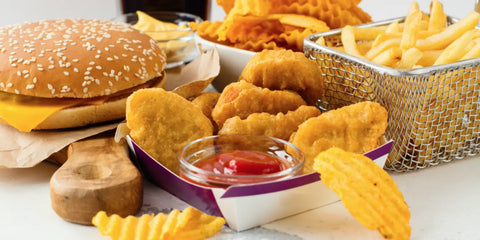It’s a phrase we hear a lot: “Minding one’s cholesterol”. But what exactly does it mean?
Our liver naturally makes cholesterol. It helps to maintain flexibility in our cell walls and is necessary for creating several different hormones in our body. As with everything, though, too much of a good thing is never actually good. Essentially, our liver produces a sufficient amount of cholesterol for our needs, transporting it via Very Low-Density Lipoproteins (VLDL) and fat-soluble vitamins in the blood. When the vitamin-loaded fats have been delivered, VLDL become Low-Density Lipoproteins (LDL), carrying cholesterol onward to wherever needed in the body. At the same time, our liver releases High-Density Lipoproteins (HDL), which carry any unused cholesterol back to the liver in a process called reverse cholesterol transport. This protects again clogged arteries and general heart disease.
Unfortunately, if we have too much LDL being transported, deposits can build up in the blood vessel walls along the way, leading to what people refer to as High Cholesterol (causing those clogged arteries, heart attacks, kidney failure, and even stroke).
If your GP has confirmed that you need to reduce your cholesterol levels, then diet is the first port of call. There are two main types of fat: saturated and unsaturated. The former is a no-no when it comes to high cholesterol. Some foods naturally contain their own cholesterol (eggs, kidneys, prawns), but this dietary cholesterol is not as impactful as fats on our body’s blood levels of cholesterol. Nonetheless, eating too much dietary cholesterol reduces the amount of natural cholesterol our liver produces.
Eating a diet comprised of too many fatty foods, not exercising enough, being overweight, and smoking and drinking excessive amounts of alcohol all contribute to high cholesterol. Instead of roasting or frying food, why not opt for grilled, steamed, poached, boiled, or even microwaved?
A recent study, as reported in The Express, found that a long-term high dose of whey protein could help to lower cholesterol levels. The study, in conjunction with the National Library of Medicine, looked into the effect of whey protein on blood pressure and vascular function, as well as inflammation in those who are overweight. General improvement in cardiovascular health resulted over the 12 weeks, with a “significant reduction in total and LDL cholesterol”.
Not all whey protein is alike, however. As Medical News Today reports, whey protein concentrate containing low levels of fat and carbohydrates), whey protein isolate (all fat and lactose removed), and whey protein hydrolysate (a ‘pre-digested form, having undergone partial hydrolysis for maximum absorption) have different effects. Soy protein is also thought to be beneficial in lowering cholesterol levels.
Aside from this recent finding, however, there are other lifestyle changes that you can make with very little effort.
Cut Down on Saturated Fat

Say no to: meat pies; sausages and other fatty cuts of meat; butter, or ghee or lard; cream; hard cheese; cakes and biscuits; food containing palm oil (though that’s an eco no-brainer anyway).
Increase the Amount of Fibre

Good bacteria that live in our gut thrive on soluble fibre. Otherwise known as probiotics, they reduce both VLDL and LDL. One study, in fact, recorded a reduction of 18% in LDL over a 12-week period when participants consuming 3g of soluble fibre each day. Another study found psyllium husk contributed to a 6% reduction in LDL. The RDA is circa 30g/day. The best sources are: legumes; fruit and vegetables (this is your Five-a-Day!); nuts and seeds; oats, barley, and wholegrains; and – yes – psyllium husk.
Eat Unsaturated Fat in Moderation

A diet high in monounsaturated fats both reduces harmful LDL and protects beneficial levels of HDL. It is thought monounsaturated fats also reduce oxidation of lipoproteins (the main contributor to clogged arteries). Polyunsaturated fats, also, have a role to play in a healthy balanced diet (think Omega-3 fatty acids) and researchers believe they might reduce the risk of Type-II diabetes. Consuming small portions of both types of unsaturated fats can actually lower cholesterol levels. So, opt for: oily fish (think mackerel or salmon); nuts (such as cashews or almonds); seeds (sunflower and pumpkin are best); avocados; and oils made from olives, rapeseed, or walnuts.
Run from Trans Fats

These also raise cholesterol levels. Originally unsaturated fats, they have been modified by hydrogenation and decrease “good” cholesterol, i.e. HDL levels, by a whopping 20%. Found especially in animal products, beware the label “partially hydrogenated” – a study on global health patterns discerned that as many as 8% of heart disease deaths worldwide were caused by a diet high in trans fats.
Exercise

An active lifestyle is absolutely necessary in the fight again high cholesterol. Whether you simply walk or become a cyclist worthy of competing in the next Olympics (the one after the rescheduled one…) – be sure to do at least 150 minutes of moderate aerobic activity every week. Your heart will thank you for it.